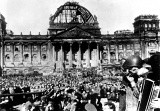
World War II: 60 Years After 2005 / Berlin / USSR 1945
The documentary film The Fall of Berlin traces the advance of Soviet forces from their repulsion of the German assault at Stalingrad to signing the capitulation of Germany in Berlin. In his celebrated historical chronicle, Raizman uses both Soviet and German newsreels, authentic responses and an additional commentary.

The documentary The Fall of Berlin traces the advance of Soviet forces from their repulsion of the German assault at Stalingrad to signing the capitulation of Germany in Berlin. In his celebrated historical chronicle, Raizman uses both Soviet and German newsreels, authentic responses and an additional commentary. The deathly silence before the attack and the nocturnal negotiations of the general staff alternate with deafening shots of the din of the war machine. After Berlin was taken on 25 April 1945, and frontline cameramen got through together with Soviet forces, the director was also able to focus for a while on the actions of individuals and the response of German civilians. They are forced to take down the barricades, but in parallel we also see them enthusiastically waving to their soldiers as they leave for the front; adopting a similar comparative role, we have shots of a Berlin destroyed by bombardment and a jubilant Moscow during a military parade. The film was screened again in Czechoslovak cinemas in 1968 under the title To Berlin!
55 min / Black & white, 35 mm
Director Yuli Raizman
/ Screenplay Julij Rajzman
/ Dir. of Photography E. Volk, A. Usolcev, A. Alexejev, G. Giber, G. Golubov, L. Dulcev
/ Music A. Rojtman
/ Editor Julij Rajzman
/ Contact Národní filmový archiv
Yuli Raizman (1903, Moscow-1994, Moscow) worked as an actor after finishing his studies, and later as assistant to Yakov Protazanov. His first independent film, Penal Servitude (Katorga, 1928), describes the fates of political prisoners in Tsarist Russia. Then came the feature documentary Soil Is Thirsty (Zemlya zhazhdyet, 1930), followed by A Story about Omar Khaptsoko (Rasskaz ob Umare Chapcoko, 1932) about the struggle against illiteracy, and Men on Wings (Lyotchiki, 1935), a film about the ordinary lives of pilots. 1939 saw the first film adaptation of Sholokhov’s novel The New Land (Podnyataya tselina), and the war was the subject of the films Mashenka (1942), Moscow Skies (Nyebo Moskvy, 1943) and, in particular, The Fall of Berlin (1945). After the war, the director focused on feature films and made works such as the cosmopolitan comedy The Train Goes East (Poyezd idyot na Vostok, 1948), the Socialist drama Cavalier of the Golden Star (Kavalier Zolotoi zvyezdy, 1950), and the lyrical story What If This Is Love? (A yesli eto lyubov?, 1961).
Národní filmový archiv
Závišova 5, 140 00, Praha 4
Czech Republic
E-mail: [email protected]

Briana Čechová
Film Institution Rep.
First-hand brews throughout the year.
Be among the first to learn about upcoming events and other news. We only send the newsletter when we have something to say.